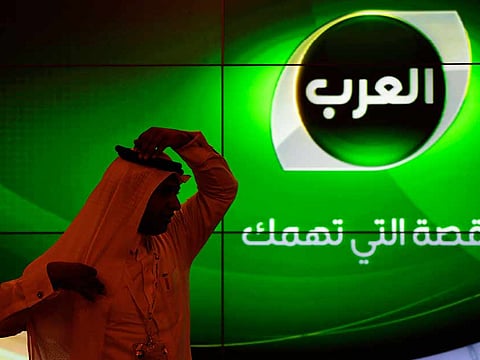Saudi-owned news channel off air hours after launch
Latest pan-Arab television news channel, went off air hours after taking to the airwaves

Manama: Bahrain-based Al Arab, the latest pan-Arab television news channel, went off air hours after taking to the airwaves on Sunday.
The channel, owned by Kingdom Holding Co Chairman Prince Al Waleed Bin Talal Bin Abdul Aziz Al Saud, started broadcasting from Bahrain on Sunday at 4pm, amid pledges that it would be an outstanding addition to the news television landscape in the Arab world.
However, hours after its launch, the channel stopped its regular programmes and beamed a loop of self-promotion highlights and features to be broadcast.
“The broadcasting has stopped for technical and administrative reasons and we will resume soon, God willing,” a news ticker on the screen said.
No other explanation was provided by the channel headed by Saudi journalist, columnist and editor Jamal Khashoggi.
However, the head of media at Bahrain’s Information Affairs authority (IAA), Yousuf Mohammad, said “cooperation with the station management was going on so that the channel resumes its broadcasting and completes the necessary measures as soon as possible.”
The station in its first news bulletin conducted a studio interview with Khalil Marzouq, a leader of Al Wefaq Islamic Society, over the revocation of the nationality of 72 people in Bahrain announced by the interior ministry on Saturday.
The interview prompted Anwar Abdul Rahman, the editor-in-chief of Bahrain’s oldest circulating newspaper Akhbar Al Khaleej, to write a front page editorial on Monday in which he accused the channel of unfairness.
“I was astonished that the channel in its first news bulletin hosted Khalil Marzouq to hear his view on the revocation of the Bahraini nationality of 72 people for harming the interests of Bahrain,” Anwar wrote. “The question, from a professional and objectivity point of view, is why Khalil Marzouq only? There are other political societies in Bahrain that have their own political stances and positions. The channel could have also hosted neutral Bahraini or Gulf political analysts to give their own views, especially that those who were stripped of their nationality were not only from Al Wefaq and belonged to various Islamic sects,” he said.
Anwar added that Al Arab’s attitude raised several questions about the orientations of the channel.
“Our advice to you is that you rise to the responsibility on the Arab issues. This is our advice to you if you are truly Arabs in your thought, culture, sensibility and commitment in your media messages,” he wrote. “Resorting to muscle flexing and allegations in the name of freedom of speech or free broadcasting will harm you in the eyes of Arab spectators faster than you can imagine. More than that, it could signal that your failure began when you were born.”
Sign up for the Daily Briefing
Get the latest news and updates straight to your inbox



